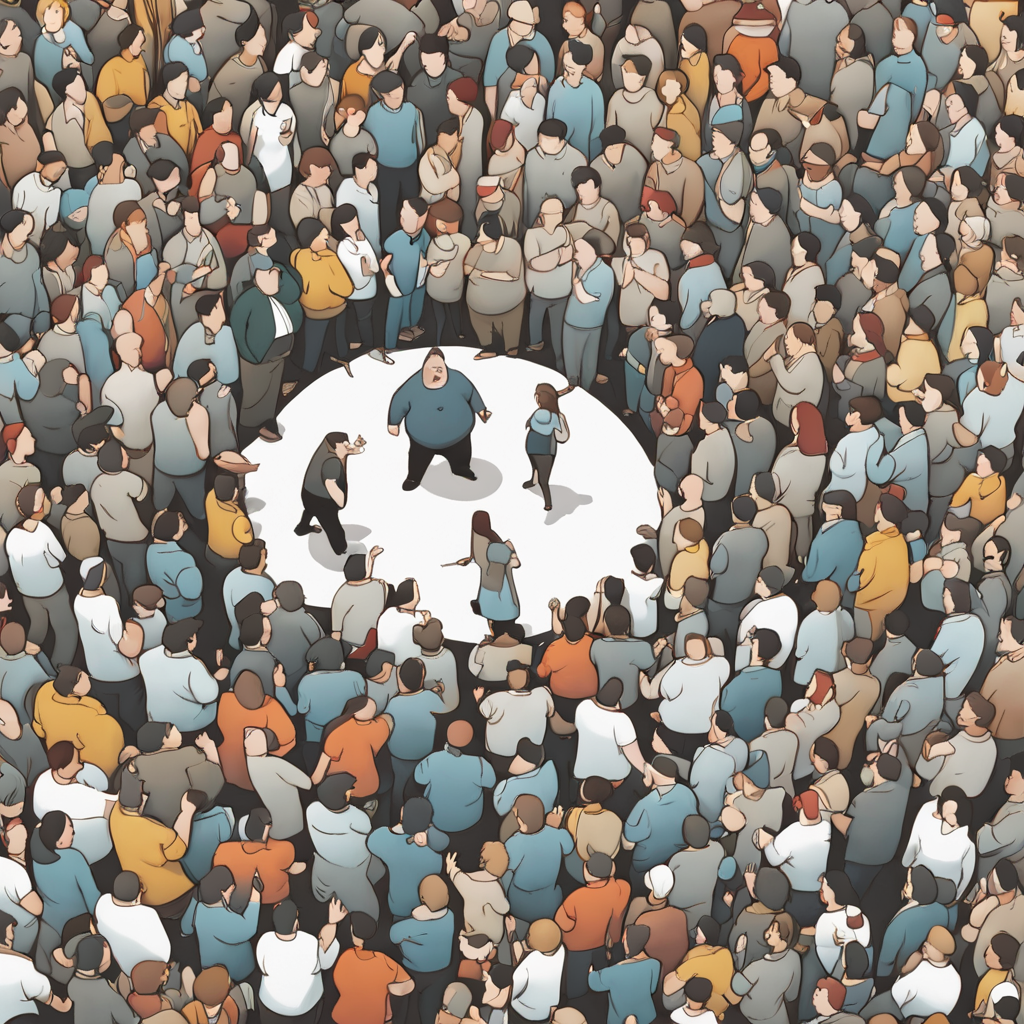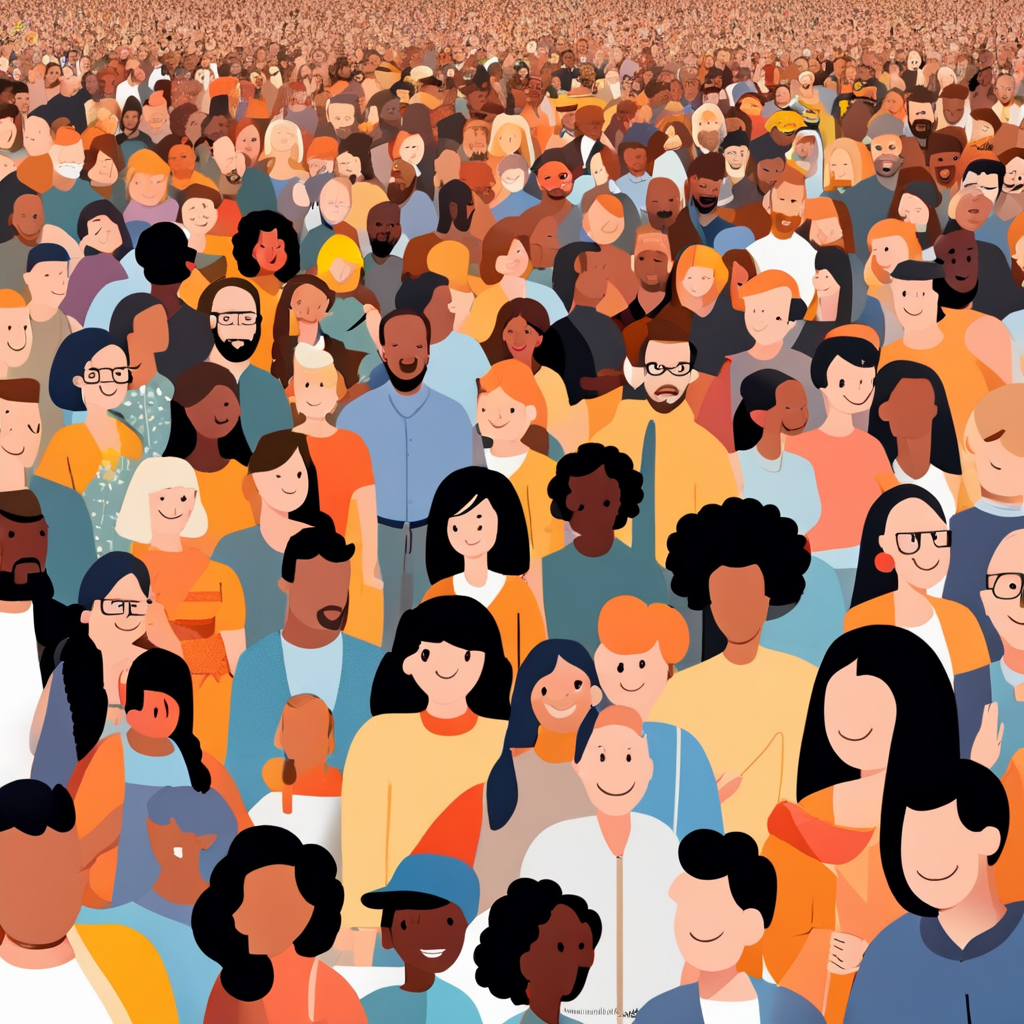Okay, folks, time for the coup de grâce. We’ve been discussing the impact of homophily (huh-MOFF-uh-lee) the past two weeks, specifically its effects on human opinion formation. Now we’re going to come up out of the weeds and take stock of the implications of all this. I find the consequences not merely sobering, but terrifying.
Let’s warm up by taking a quick sampling of the opinions you hold on controversial issues. Zoom through this sample list and mentally tick off where you stand, on a continuum of 0 to 1:

- Are human beings basically good or basically selfish?
- Should the government provide health care for its citizens?
- Is capital punishment humane?
- Does our society currently under-reward, or over-reward entrepreneurs?
- Should citizens be given vouchers to use at private K-12 schools?
- Does life begin at conception, birth, or somewhere in between?
- Should illegal/undocumented persons in the U.S. be given a path to citizenship?
- Is a one-state, or a two-state solution the best outcome for Israel/Palestine?
- Should colleges consider race in their admissions decisions?
- Can one’s gender legitimately be different from their sex at birth?
- Should there be limits to how much one can contribute to political campaigns?
- (…you get the idea…)
Some of these you may be undecided on, and that’s okay. Ignore those for the moment. The remainder is now the beginnings of a personal list of your current issue positions.
Now here’s the punchline. That list is almost completely unreliable. You should probably just throw it away. “Whoa, throw away everything I think I believe?!” Pretty much, yeah. It’s mostly hot garbage.

Why do I say that? Here’s why. Some of those opinions (a minority of them, I’m certain) are positions you actually arrived at through careful consideration. You took stock of both sides, applied your principles and reasoning, and came up with your stance. But the rest (a majority, I’m certain) are positions you simply absorbed from other people. You hold position X not on its merits, but because someone you trust — quite possibly because they agree with you on some entirely different issue, or maybe just because you like them — spoke in favor of position X. You quietly assimilated it, probably without really analyzing it.
And to make matters immeasurably worse, you’ve lost the paper trail. You no longer have any record of why you adopted position X on issue 7. It might be because it’s actually your considered opinion, but then again it’s more likely that you simply picked it up from an acquaintance without fully dissecting it. In the latter case, you’ve likely forgotten who the influencer even was. (AI practitioners will notice the resemblance to the “provenance” problem in knowledge-based agents, and recognize that our brains are essentially using a non-monotonic logic.)
Any opinion you absorb is simply “in your brain” with all the others, and if called to justify it you’d probably trot out talking points that aren’t even yours. Only an exhaustive inventory of all your beliefs — erasing your presuppositions about each one and subjecting it to fresh, individual scrutiny — would rectify your list. Only then would you have a list that properly reflects what you objectively think about the world.
Let’s weave a concrete narrative to make this more clear. Our hypothetical “Joe,” when a young man, developed genuine conviction on a particular issue. To pick one, let’s say Joe’s observations and experiences led him to feel strongly that racial minorities are unfairly disadvantaged in many aspects of American society. He thus develops a passion for rectifying these inequities and leveling the playing field.
Now the principle of homophily dictates that when he chooses his friend groups, Joe is going to be much more likely to associate with those who agree with him on this issue. He doesn’t generally feel like he “clicks” with those who oppose it, and would rather spend time bonding than arguing. Then, when he hears his friends speak on other topics — which he doesn’t (yet) have a passion for or even a settled opinion about — he unconsciously “bends” towards their point of view. Many of the people who share his opinion on racial inequity, it turns out, also believe that abortion should be legal up to the moment of birth. Many of them also believe that our tax system benefits the rich, that health care is a basic human right, and that the death penalty should be abolished.

It’s not likely that Joe will resist those views, especially since they are consistently condoned by people he trusts. And even if he objected to some of them, it would be very difficult for him to admit that out loud, because he’d be going against his “in crowd.” So he quietly absorbs these other opinions into his brain without too much fuss.
Now fast-forward ten or twenty years. If you asked Joe to tick off his positions on the above questions, just as you did, he will feel quite confident about each of them, especially because the only people (and media) he usually hears from confirm them. And unless Joe has unusually high self-awareness, he’ll have forgotten that it was the racial inequity issue that started him off on the path to his current position choices and friend choices. He will simply be in a polarized bucket, with most of his beliefs determined accidentally rather than deliberately, and no record of which is which.
I’ve recognized this principle playing out in my own life pretty often, though I’m sure not nearly as many times as it has actually occurred.
For brevity’s sake I’ll mention just one example. When I lived in California, I can vividly recall the run-up to Proposition 174, a statewide ballot initiative establishing vouchers for private schools. Every person and every radio station I heard weigh in on the subject was all in favor of the proposition. It would help public schools get their budgets under control, they said; it would give more freedom to parents; it would bring accountability to teacher’s unions. This reasoning was offered so frequently and so passionately by sources I trusted that (looking back on it) I unconsciously absorbed it as my own. In fact, those very talking points came back out of my mouth, and forcefully.

At the time it didn’t feel like I was merely parroting what I had heard — on the contrary, I felt very convicted of my position and my reasoning, and tried my best to sell others on it. But today, removed from the immediacy of the campaign and the emotional temperature of the debate, I can’t help but shake my head at my 1993 self. “What was I thinking?” Of course I believe in — and have always believed in — the tremendous importance of public education: it’s one of the greatest (and underappreciated) treasures America has. And of course a voucher program like the one prescribed by Prop 174, despite its charms, would undermine that treasure on many levels. That is, when I sit down and rationally consider the issue “from scratch,” looking only at its objective pros and cons, I find myself holding the opposite position I did when I was immersed in the opinions of my friends.
Incidentally, here’s a thought experiment worth pondering. Consider the following litmus test. If you truthfully started “from scratch” on an issue — erasing everything you’ve previously heard about it — and reasoned things out from pure principle, would you come to the same conclusion you supposedly hold about it now? My guess is that for most issues, this isn’t much better than 50/50.
Finally, if I’ve managed to convinced you that the human mind is the dumpster fire I think it is, the next question is, “what do we do now?” And I think there is a good answer to this that will spur optimism. Not all is lost.
I lamented above that we’ve lost our receipts: there’s no way to know which of our opinions are genuine (in the sense that if we objectively reasoned them out again, not under duress, we’d arrive at the same conclusion) and which were merely absorbed. But things probably aren’t quite this bad. Even if our memories don’t guide us, our passions might. When you went through the above list of questions, you probably reacted to some of them with more heat and solidity than others. That in turn might be an indicator as to which are more “primal” for you, and which are thus more likely to be genuinely felt than absorbed.

While I’m a believer in holding all one’s beliefs tentatively, always remaining open to new arguments or information, surely this is especially true for those beliefs in which we never really gave the other side a hearing. If I’m right, and the majority of your opinions you slipped into without really considering them, this means we ought to be very liberal indeed in what we choose to re-examine.

I suggest the following algorithm.
- Engage in some self-reflection, and try to identify your core beliefs out of that huge list. By “core” I just mean more fundamental, more deeply felt, more tightly woven into your worldview than the others. (In our Joe example, “proactively addressing racial disparity” was part of his core.) I can’t say for sure how many items will be part of your core, but think small. The vast majority of your opinions will be twigs and branches, not trunks.
- For each “core” belief, try to articulate to yourself why it’s part of your core. Why are you so sure about it? What makes it so important to you relative to other things? Why do you consider it non-negotiable? Do this on paper if possible. It might lead to more purging than you realize.
- For all the rest (non-core), take a deep breath and try to release your hold on them. Quiet your internal monologue about them. Try to let them float. Keep your mind as impartial as possible about them, no matter who or what you’ve heard in the past. To the extent you can, try to actually forget what your previous position on them was.
- Finally, as you work out your true position on each non-core issue, make a deliberate attempt to counter the homophily bias this whole series of posts has been about. If you know you’ve been hanging around (say) conservatives a lot, and you know that conservatives tend to be closer to the “0 side” of the issue’s continuum than the “1 side,” give yourself a conscious nudge towards 1. Not such a strong nudge that it’s determinate, but one which will help you be better calibrated towards true impartiality as you think things out.
And speaking of nudging yourself towards a better balance, my last word today will be about people, not opinions. Homophily teaches us that we innately prefer to surround ourselves with those who resemble us. Fair enough, but now that we’re aware of this partiality, it would behove us to neutralize it as much as possible. Consider the “fringe” of your social circle, and keep an eye out for those who are different than you in important ways. Make a conscious effort to seek them out, and build bridges to the heterophilous. It will be hard at first, since you’re fighting against human nature. But I think your world will be richer as a result.
— S



Leave a Reply